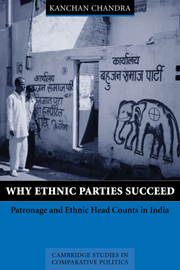Book contents
- Frontmatter
- Dedication
- Contents
- List of Maps, Figures, and Tables
- List of Abbreviations
- A Note on Terminology
- Acknowledgments
- 1 Introduction
- Part I Theory
- Part II Data
- 6 India as a Patronage-Democracy
- 7 The Bahujan Samaj Party (Bsp) and the Scheduled Castes (SCs)
- 8 Why Sc Elites Join the Bsp
- 9 Why Sc Elites Join the Bsp
- 10 Why Sc Voter Preferences Translate into Bsp Votes
- 11 Explaining Different Head Counts in the Bsp and Congress
- 12 Extending the Argument to Other Ethnic Parties in India: The Bjp, The Dmk, and The Jmm
- 13 Ethnic Head Counts and Democratic Stability
- Appendix A Elite Interviews
- Appendix B Ethnographies of Election Campaigns
- Appendix C Content Analysis
- Appendix D Description of Survey Data
- Appendix E Description of the Ecological Inference (EI) Method
- Appendix F Method Used to Estimate Ethnic Voting Patterns
- Bibliography
- Index
- Miscellaneous Endmatter
13 - Ethnic Head Counts and Democratic Stability
from Part II - Data
Published online by Cambridge University Press: 19 October 2017
- Frontmatter
- Dedication
- Contents
- List of Maps, Figures, and Tables
- List of Abbreviations
- A Note on Terminology
- Acknowledgments
- 1 Introduction
- Part I Theory
- Part II Data
- 6 India as a Patronage-Democracy
- 7 The Bahujan Samaj Party (Bsp) and the Scheduled Castes (SCs)
- 8 Why Sc Elites Join the Bsp
- 9 Why Sc Elites Join the Bsp
- 10 Why Sc Voter Preferences Translate into Bsp Votes
- 11 Explaining Different Head Counts in the Bsp and Congress
- 12 Extending the Argument to Other Ethnic Parties in India: The Bjp, The Dmk, and The Jmm
- 13 Ethnic Head Counts and Democratic Stability
- Appendix A Elite Interviews
- Appendix B Ethnographies of Election Campaigns
- Appendix C Content Analysis
- Appendix D Description of Survey Data
- Appendix E Description of the Ecological Inference (EI) Method
- Appendix F Method Used to Estimate Ethnic Voting Patterns
- Bibliography
- Index
- Miscellaneous Endmatter
Summary
There is a general sense of disquiet among political scientists, and among the newspaper-reading public more generally, about the impact that a politics of ethnic head counts can have on democratic stability. At the heart of this disquiet is the notion that ethnic head counting leads to the creation of “permanent” majorities and minorities, predetermined by ethnic demography. As Horowitz puts it, “absent some dramatic change in group demography … the result of the election is likely to hold for the next election and for every election thereafter.” The permanent exclusion of minorities from power, where it occurs, is likely to lead to escalating violence between minority and majority groups and put the survival of the democratic system at risk.
The argument of this book suggests, however, that it is precisely because the rise of ethnic parties is determined by ethnic demography that we may have reason to be less pessimistic. The strong incentives that political elites have to manipulate the definition of ethnic categories in patronagedemocracies may prevent the emergence of “permanent” results. And where electoral outcomes can be transformed by political manipulation, we are less likely to see the permanent exclusion of minority groups and the destabilizing violence associated with permanent exclusion. I develop this suggestion here, drawing upon examples of such heresthetical maneuvers by politicians in India.
If voters prefer elites and parties that represent their “own” category, then one way in which political entrepreneurs can manipulate electoral outcomes is to pass as members of the voter's “own” category. The many ambiguities that shroud the origin and markers of ethnic categories make such “passing” possible. One example of such an attempt comes from the struggle for the votes of the Pasi caste, one of the many Scheduled Caste categories in Uttar Pradesh. Pasi elites, as I pointed out in Chapter 8, were weakly represented in the Bahujan Samaj Party (BSP), even though the BSP attempted to market itself as the party of all Scheduled Castes. As a consequence, the BSP's support base among Pasis was vulnerable to incursions by other politicians.
- Type
- Chapter
- Information
- Why Ethnic Parties SucceedPatronage and Ethnic Head Counts in India, pp. 287 - 292Publisher: Cambridge University PressPrint publication year: 2004



